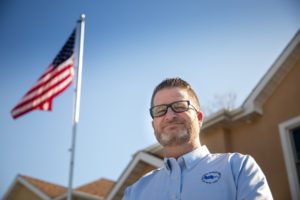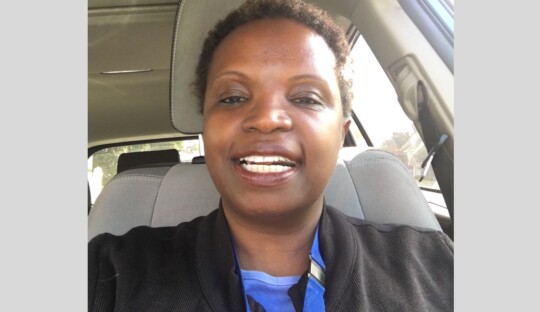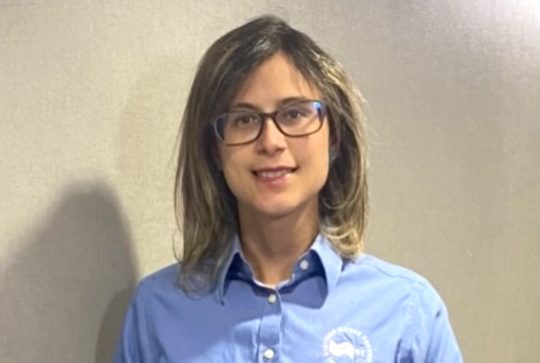Meet Christopher Webster, Veteran Liaison for VNSNY Home Care
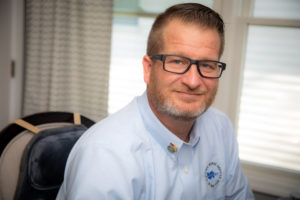 Christopher Webster, a retired Army medic, knows how transformative it can be to reach out to a fellow veteran in need. Years ago, as part of a professional outreach, Christopher visited a homeless veteran who’d been living in the Long Island woods for twenty years. The two steadily built a relationship that resulted in the client connecting with Veterans Administration and getting the benefits and services he needed, including stable housing.
Christopher Webster, a retired Army medic, knows how transformative it can be to reach out to a fellow veteran in need. Years ago, as part of a professional outreach, Christopher visited a homeless veteran who’d been living in the Long Island woods for twenty years. The two steadily built a relationship that resulted in the client connecting with Veterans Administration and getting the benefits and services he needed, including stable housing.
“He got out of the woods and back on his feet, and today he’s thriving,” says Christopher. “He didn’t want help at first because people had made too many broken promises. But I introduced myself as a fellow veteran, a peer, a brother. And one thing you learn in the military: You don’t leave your brothers and sisters behind.”
Today, Christopher is utilizing those same outreach skills as the VNSNY Veteran Liaison for VNSNY Home Care’s Veterans Program, which was initiated in June 2020 with a grant from the Mother Cabrini Health Foundation. Realizing there was a growing need for services tailored to veterans within its Home Care division, VNSNY created a program that works strategically to help those veterans get the culturally sensitive care and additional benefits they deserve, explains Rhonda Soberman, VNSNY’s Manager of Program Development, who helps oversee the new program. “The VA is a very complicated place, and those benefits are invaluable to veterans on their health journey,” Rhonda says.
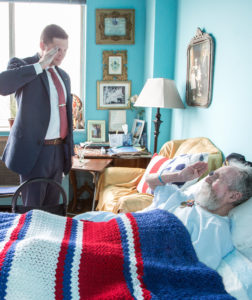
Joe Vitti salutes a veteran receiving care from VNSNY Hospice.
The VNSNY Home Care Veterans Program extends VNSNY’s deep commitment to providing culturally sensitive care and advocacy to veterans. Since 2015, VNSNY’s Hospice Veterans Program, under the guidance of Director Joe Vitti and with the support of Veterans Liaisons Sung Yoon and Erica Wigley and VA Benefits Specialist Frank Quadrino, has had a positive impact on thousands of New York City veterans at the end of life and their families, providing bedside military memorials and helping them to secure medical, disability, funeral and education veteran benefits.
Since the VNSNY Home Care Veterans program was launched mid-year it has served more than 300 veterans. “I work with clinicians and staff at VNSNY not only to raise their awareness of veterans’ needs but also to assist in getting those needs met,” says Christopher. “That can include enrolling patients into the VA system from scratch, or helping identify and get more benefits to help their recovery.”
These benefits may involve coverage for additional home health aide hours, assistance with durable medical equipment or electronics, and primary or specialty care from the VA. “There are so many different healthcare benefits that veterans can be entitled to, but most people don’t know the ins and outs of what’s available,” adds Christopher. “The process can be so frustrating and overwhelming.”
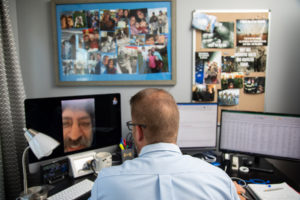
Christopher Webster doing a phone visit with a military veteran who is a patient with VNSNY Home Care.
Christopher, who indeed does know the ins and outs, recently got a thank you letter calling him a “guardian angel” from the wife of a veteran with terminal cancer. The couple didn’t know they were entitled to myriad veteran benefits that Christopher was able to secure for them, including additional home health aide hours and even funeral benefits as they planned ahead for end of life. He also connected them, as he does with many patients, to a joint VA-Apple program that provides a free iPad to facilitate telehealth visits. For another patient, a veteran who was struggling with aphasia, Christopher coordinated between VNSNY and a VA speech therapist to provide the patient a special electronic device that helped him communicate.
In addition to navigating entitlements, Christopher works with VNSNY clinicians and veterans to build trust, which is key to any plan of care’s success. “We veterans are—I’m told—a very stubborn, guarded bunch,” says Christopher, a medically retired Sergeant First Class who has been working professionally with veterans since his discharge in 2012. “I start by telling them that I, too, am a disabled vet. The fact that I was in the military allows me to empathize with them, and from there we can joke around. I can communicate with them on a peer level, and they can focus on getting better and getting healthy, which is what home care is for.”
